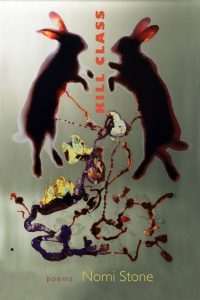Shall We Play a Game? Daniel Jenkins (poetry ’18) reviews Kill Class by Nomi Stone (poetry ’17)

An excerpt from Daniel Jenkins‘ (poetry ’18) review of Nomi Stone‘s (poetry ’17) new collection Kill Class, published by Tupelo Press. Read the full review at Poetry Northwest.
Shall We Play a Game?
I must’ve been eight or nine the first time I watched War Games, the 1983 action film starring Matthew Broderick and Ally Sheedy, about a tech-savvy teenager who hacks into a computer war game called ‘Global Thermonuclear War.’ Much of the film involves Broderick and Sheedy running into and from the government, but what has stayed for me is the five-word question that flashes across an old black DOS screen, cursor blinking green on black: SHALL WE PLAY A GAME? At the story’s conclusion, when playing ‘Global Thermonuclear War’ is suggested for a last time, the computer says, A STRANGE GAME. THE ONLY WINNING MOVE IS NOT TO PLAY. This blur between playacting and real warfare in the film scared the hell out of me. Those five words became an entrance to my childhood reality: growing up in a culture saturated with an enemy—The Soviet Union—somewhere over “there,” but not “here.” Kids in the 80s could unravel the acronym ICBM. I knew their purpose. But never once was I asked, Shall we play a game?
Kill Class, the second full-length collection of poems from poet and anthropologist Nomi Stone, embodies the fear and reality of this question. In the same way Stone used her fieldwork studying the Jewish community of Djerba in Tunisia through her first poetry collection, Stranger’s Notebook (2008), she opens her field journals once again in an unveiling of the American military machine. Stone explains in the book’s contextual notes that these poems come from
. . . two years (2011-2013) of ethnographic fieldwork, observing predeployment exercises in mock Middle Eastern villages at four military bases across the United States. The setting of these poems is the Middle East-inflected, US military-created fictional country of Pineland, in the woods of the American South, where people of Middle Eastern background are hired to theatricalize war for the training soldiers, repetitively pretending to bargain and mourn and die.
Kill Class gives us Gypsy, the collection’s heroic centerpiece. She is, according to Stone, a hybridized anthropologist-speaker and sometime “role player.” Through her studies of Pineland, she observes, interviews, and even participates in war games along with those people of Middle Eastern background who have been hired to play guerillas, the dead, the grieving, and the avenging. Throughout, Gypsy and the role players receive instructions from American soldiers conducting the trainings. Kill Class ultimately asks readers—through digressions, refractions, and the dismantling of consciousness—to directly confront the indirect and faceless experience of 21st-century warfare.
[… continue reading “Shall We Play a Game” at Poetry Northwest.]



